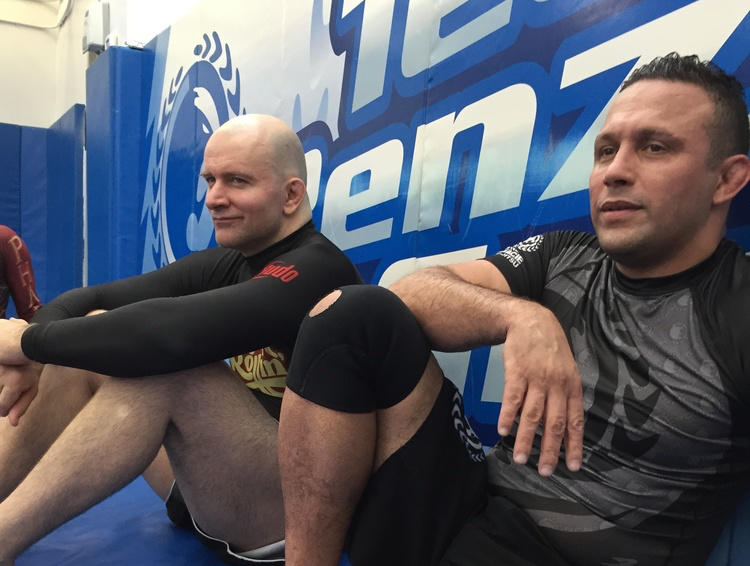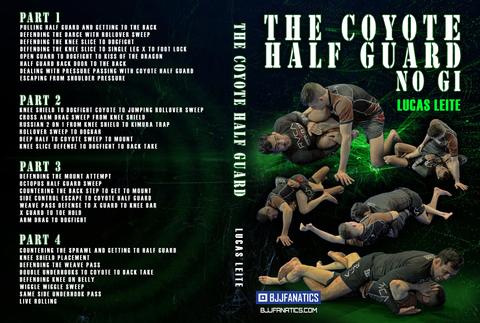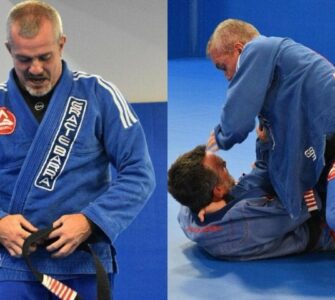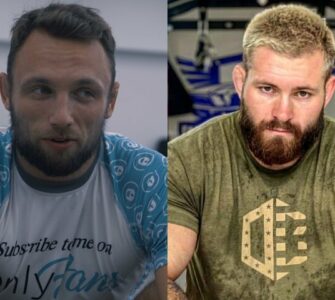BJJEE interviewed famed instructor John Danaher and covered interesting topics such as what made him into such an articulate and experienced instructor, developing problem solving mindset and using trial and error to best improve.
BJJEE: You are known as one of the best coaches in our sport. What do you think were the most beneficial things in terms of your development as a coach?
Also, for us geeks, it has been brain-expanding to realize that you have a master’s degree in Philosophy. Do you believe that the general approach to the study of philosophy has helped you develop a greater understanding for Jiu Jitsu?
John: I believe that the two activities I engaged in, which are outside of Jiu Jitsu, but which helped the most in my Jiu Jitsu development both as a student and as a teacher, were the study of philosophy in college/university and physical training with weightlifting and basic gymnastics.
Philosophy was crucial because it is among the best means of developing a PROBLEM SOLVING mindset. I see Jiu Jitsu as an activity where the central goal is to win a competitive game by solving the problems your opponent creates for you – faster and better than he solves the problems which you create for him. As a general rule in Jiu Jitsu, you cannot overcome the problems we face by simply trying harder. If you are caught in an arm bar, exerting your muscular strength harder will not save your arm. You must perform a sequence of intelligently directed movements that solve the mechanical and tactical problem you are in – knowledge, skill and tactics are the basis of success – so a mind that sees every challenge in Jiu Jitsu as A PROBLEM TO BE SOLVED can be a very useful thing.
The other pursuit, physical conditioning and exercise, is useful in two ways. The first is superficial. Jiu Jitsu is a physical sport. As much as we all love knowledge and efficiency, let’s not kid ourselves – strength and physical condition is a very useful thing in combat sports, and when two athletes whose skill level is closely matched face off, it often decides the outcome.
In truth, however, this is not the most important role that strength training played in my development, as I was never very strong and actually went through my life with a badly crippled leg, so my strength overall was quite feeble. The real value of strength training is to build within you the single greatest feature of all good coaching programs: the notion of PROGRESSION. We all start off in every job, sport or hobby we engage in as neophytes – weak and devoid of skills. As such, if we are to attain our goals, we need TIME and PROGRESSION. We need to start with easy tasks and build up to what currently seems impossible. When a students builds an unshakeable faith in the semi miraculous POWER OF PROGRESSION to make ordinary people capable of extraordinary actions – then I know they can one day do something great.
BJJEE: So, time and progression are the crucial components. And you have been following them diligently yourself; it is said that you started spending more than 12-14 hours each day back when you were called upon to become a coach in the Renzo Gracie’s Academy.
Could you tell us, what did you focus on during these extended periods of time on the mats? Were you always drilling or rolling, or was there an another dimension to the time invested?
John: I was known for spending large amounts of time on the mats. I taught two to three big group classes per day and was booked every hour between them for private classes. I liked this because I was a very late starter in Jiu Jitsu – starting at twenty eight years old – so I felt that I needed to accrue many hours of mat time quickly, to match the hours people who started much earlier in life had already amassed. Much of it was simply teaching people how to perform better in Jiu Jitsu, but because Jiu Jitsu is a very hands on sport and I personally drilled and sparred with everyone of my clients every time I taught, I got countless opportunities to identify problems in my game and the game in general, and would always try to improve the solutions I had been taught. The central feature of my method over the years has always been a TRIAL AND ERROR method, where every day presented numerous opportunities to try new theories and concepts and test the results. At the end of every day (I worked as a nightclub bouncer in the evenings) I would reflect upon the main themes/lessons I had learned and begin the process again the next day.
BJJEE: Very insightful, thank you! Now, your knowledge of and eye for the BJJ concepts is something that is revolutionizing the understanding of the entire sport, even for the „everyday jiujiteiro“; and especially with the help of your well-known instructionals.
What do you think has made you so prominent in analyzing and understanding the game of Jiu Jitsu? Is there a specific skillset you might think is crucial for honing such an „eye“ for detail in BJJ?
John: The main thing that has aided my coaching has been an ability to work towards a satisfactory reconciliation between two conflicting demands that all coaches have to try to satisfy. The first is the need to give students an overall sense of DIRECTION in their training, which means that they always know what they should be moving towards in a match situation – this concerns their strategy and tactics. The other is the need for the small details that make their performance effective – this concerns knowledge and skill development.
Details without direction lead to paralysis and direction without details is ineffective. Only the successful marriage of the two makes for good Jiu Jitsu. As for a specific skill – it is simply the use of trial and error to constantly look for better ways of doing the same things all Jiu Jitsu players must do in order to be successful on the mats.
BJJEE: So, if there were a „type“ of a Jiu Jitsu player or student that you most enjoy working with – training him or her – what would the traits of this student be? In terms of their mental approach, their work ethic and other aspects that are important to you?
John: A coach has to be able to work with whoever is in front of him and create improvement. I’m happy teaching pretty much anyone; but, probably, my two favorite coaching situations are polar opposites of each other. I love to teach the fundamentals of the sport to total beginners, and I love to teach advanced athletes the nuances that can take them from good to great.
Interestingly, the best students must bring to me the one thing I can never give to them – passion for Jiu Jitsu. That must come from within them. If it’s there, they can do incredible things over time, and if it is not, then no amount of coaching will help them.
I should add at this point that, throughout my career, I have been blessed with many truly outstanding students who made my task a real pleasure. All were deeply passionate about the sport and technical innovators and extraordinarily hard workers. You must remember that I never competed in Jiu Jitsu and so have no achievements of my own – I owe everything to my students.
BJJEE: Likewise, if you had to teach only one concept or approach in your classes, which one would it be?
John: Literally every day I teach, every class, every lesson and every move comes down to one core concept – I teach Jiu Jitsu as the art and science of control that leads to submission. The closer you stay to this vision of the sport, the more satisfying Jiu Jitsu is. The more you deviate from it, the worse it looks.
BJJEE: Thank you for partaking in this interview and for the amazing insights, Mr Danaher. Prior to us concluding it, is there something else that you would like to share with our readers?
John: Understand that there are five essential things you need to excel in Jiu Jitsu and, indeed, in anything in life.
The first is PASSION. If you lack that – nothing else can help, for only a deep passion for some activity will keep you on course through all of the many trials, frustrations and disappointments you will inevitably suffer through as you work towards what you want. No one else can give this to you – it must come from within. Search within yourself and ask: what are the things which you would happily do for the rest of your life for free? And then forge your career around those things. Life is short – do what you love.
The second is a DEFINITE GOAL. A person without goals drifts through life, reacting to things that occur around them. There is nothing wrong with that and, arguably, this a better way to achieve basic happiness or pleasure. However, if you want to go further than simple happiness or pleasure, and make notable achievements, you must have a goal so that your life has focus. In a world of a million possibilities those who become remembered are those who can focus for a lifetime upon only one or two.
The third is an INTELLIGENTLY CRAFTED PLAN to get you to those goals. Understand that effort and sweat are no guarantee of success. Only intelligently directed effort gets you past the myriad of obstacles that block your path to your goals. And the single best basis for formulating such a plan is the trial and error method that forms the basis of the scientific method. Test your theories and compare them with the evidence before you.
The fourth is the DISCIPLINE to stick to that plan for whatever length of time that is necessary to get you to those goals. All great achievers have a common feature – a life dominated by routine that enabled them to build the expertise necessary to stand out from the crowd and do something remarkable.
The fifth is the ADAPTABILITY to change or modify those goals and plans in the face of changing life circumstances and evidence. Life is a chaotic and fluid thing, and what seemed perfectly reasonable and sensible a year ago may not be so now – so constantly review your plans in the face of new emerging evidence and be prepared to make the necessary changes.
If you can stay true to these five elements you can do something remarkable in Jiu Jitsu or any other aspect of life you choose to devote yourself to.
For The First Time Ever, Lucas Leite Shares His World Famous Coyote Half Guard Adapted For No Gi.
Learn The Weird Techniques that Lucas Leite uses so well against bigger opponent’s that he voluntarily enter tournaments in the ultra-heavy division with an almost 100 lb weight deficit.


















